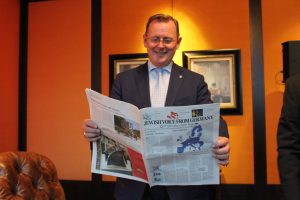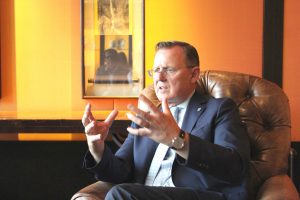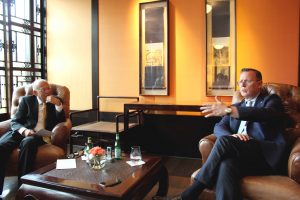Thuringia’s minister president Bodo Ramelow states that the lack of “a clear difference between the bourgeois-conservative camp and the left wing-liberal camp” poses a problem for German politics. In our exclusive interview, Ramelow also outlines his hands-on approach to the task of integrating refugees into German society and the labor market, introducing the idea of an integration contract…
What solutions does the Left Party offer to the challenges of the 21st century?
First of all, I am concerned that we no longer offer people any clear political positions. Many people evidently like to identify with one camp or another. But this need for a binary system cannot find fulfillment, because right now everything is somewhere in the middle. I think it would be a good idea if there were once again a clear difference between the bourgeois-conservative camp and the leftwing-liberal camp.
As a leftist politician, how do you address complex challenges such as the income gap, access to education and affordable housing?
We live in one of the richest countries in the world. I believe the problems we have can, in principle, be solved. According to a recent sociological study of Germany, 30-to-50-year-olds say they are doing well; nonetheless we are frightened of the future.
What are people frightened of?
Being poor when they are old, and downward social mobility. While a few wealthy people are getting richer and richer, the vast majority are not seeing any increase in prosperity. Since the Berlin Wall came down in 1989, the number of people in full-time employment has shrunk by five million. More and more people have insecure and poorly-paid jobs.
You are a leftist. The Marxist ideal of justice plays a role for you. What went wrong in the Marxist countries?
People have always been concerned with the question of an ideal society, an ideal way of life. Early Christianity also bears the stamp of this dream. But this dream becomes something terrible, at the very latest, when it is coupled with a power structure. This holds true for all fanatical religious power structures that claim to be based on Christianity. Today there is a lot of talk about the dangers of Islam, but I would like to point out that here our Christianity has a much older tradition, and a very bloody one at that.
But you are a practising Christian.
Yes, I even believe in paradise, though I don’t know if I shall be going there. I find strength in the Epistles of St Paul to his community. Without Paul, that Jewish sect would not have developed into a world religion. Those who now wander about crying out that they want to defend Christendom and Western civilization have understood neither Christendom nor Western civilization. If they knew that the area where Paul of Tarsus came from and where this world religion emerged is precisely where today’s refugees come from and where the most brutal violence prevails, they might address the challenge in a friendlier manner. In fact, they do the opposite. The events in Bautzen (where a rightwing mob attacked young refugees (ed.)) are frightening.
What are you doing to promote the integration of refugees in Thuringia?
We have spent a lot of money on renting vocational training centers. We have mobilized people in charge of workshops and factories and asked them to get involved and to help. We have got our small and medium-sized companies involved in setting up internships.
There are big differences between, for example, Syrians with a good education and illiterate Afghans. But we have to identify every single talent and think about where it might be best deployed. I would like it if we could offer every individual an integration contract, in which we set out clearly what we are offering and what we are expecting. In Thuringia, we have one thousand young people in vocational schools for a vocational preparation year. Learning the language and learning a skill means we have new apprentices in the making. In my state we have 3800 unfilled vacancies for apprenticeships. My state will need 200,000 skilled workers by 2025 just to replace those who will be retiring.
I want to pursue integration in a practical and pragmatic manner. The entire administrative apparatus has so far been defensive in its approach. Our aliens law and refugee law are such that people spend as long as possible in some hostel so that they write home and say, “Whatever you do, don’t come to Germany!” We want to appear open-minded and welcoming to the outside world, while actually conveying exactly the opposite message.
Populism is on the rise internationally at the moment – the United States, Hungary, Austria, Poland, France. What can be done to counter this trend?
I am amazed it took so long to reach us. We were always outraged by developments elsewhere, but never took a closer look at the issues behind them. I am convinced that we can solve every problem. But the longer we avoid solving problems, the more negatively people view the government and its policies. That has led to a considerable degree of insecurity both here and in other European countries. It is Europe that guarantees our ability to take part in global markets and prosper. But we have failed to explain that to the people – in a country with such a large trade surplus.
Why is Germany so timid in its dealings with President Erdogan?
Chancellor Merkel is trapped because of her refugee deal with Erdogan. The slide towards dictatorship in Turkey is a cause for concern. Erdogan started out as a reformer. The first time I addressed parliament in Ankara and talked about freedom of religion and about Christian churches in Turkey, the most pleasant discussions I had were with politicians from his AKP party. That openness has since vanished.
Erdogan has a new friend, namely Putin. Do you see this axis of despotism as a danger with the potential to further destabilize the region from Ukraine to the Middle East?
I do not feel the need to envision new despots. In retrospect, one can say that despots tend to contribute greatly to destabilization. The butcher Assad and the butchers of IS are out there every day. And then there are Hamas and Hizbollah. Israel is encircled by enemies. Let us try to focus on what more we can do to promote peace. That means talking and not creating ever new bogeymen…
But you have to call a despot a despot…
Call him whatever you like.
Putin annexed Crimea…
Don’t you think the people themselves have to resolve that? Shouldn’t we respect these countries rather than adopt the role of strict schoolmaster? I can tell you that Putin is not my friend, but I still fly to Russia to talk to people there, because Thuringia has many ties to Russia and many ties to Ukraine. There is no alternative to dialogue.
In Germany there is a consensus about assuming responsibility for the genocide of the Jews. What about the living Jews in this country?
Our Jewish community in Thuringia, which has about 800 members and is very lively, is an engaged partner. We have done a lot together. My first trip as state premier was to Israel, and not to the West Bank and not to Gaza. Jewish tradition, Jewish life is part of our life, part of my life.
The debate took place at the China Club Berlin


